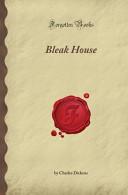Quotes from book
Bleak House

Bleak House is a novel by Charles Dickens, first published as a 20 episode serial between March 1852 and September 1853. The novel has many characters and several sub-plots, and is told partly by the novel's heroine, Esther Summerson, and partly by an omniscient narrator. At the centre of Bleak House is a long-running legal case in the Court of Chancery, Jarndyce and Jarndyce, which came about because a testator has written several conflicting wills. In a preface to the 1853 first edition, Dickens claimed there were many actual precedents for his fictional case. One such was probably the Thellusson v Woodford case in which a will read in 1797 was contested and not determined until 1859. Though the legal profession criticised Dickens's satire as exaggerated, this novel helped support a judicial reform movement which culminated in the enactment of legal reform in the 1870s.There is some debate among scholars as to when Bleak House is set. The English legal historian Sir William Holdsworth sets the action in 1827; however, reference to preparation for the building of a railway in Chapter LV suggests the 1830s.

“It is said that the children of the very poor are not brought up, but dragged up.”
Source: Bleak House (1852-1853), Ch. 6

“Your sex have such a surprising animosity against one another when you do differ.”
Source: Bleak House (1852-1853), Ch. 54, Mr. Bucket to Mademoiselle Hortense

“The one great principle of the English law is, to make business for itself.”
Source: Bleak House (1852-1853), Ch. 39